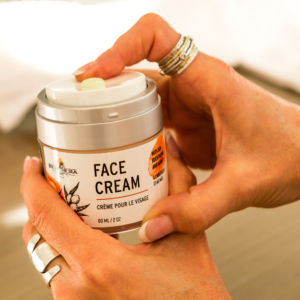The winter months bring chilly temperatures, which can leave your skin feeling dry, tight, and uncomfortable. During this time, it’s essential to pay extra attention to your skin care routine. In particular, keeping your face cream healthy and your skin hydrated should be your top priority. Here’s a detailed guide on how to maintain healthy skin throughout the winter season.
Why Winter Skin Care Matters
Winter’s cold air and low humidity levels can have a significant impact on your skin. The lack of moisture in the air often causes your skin to lose its natural hydration, leading to dryness, flaky patches, and irritation.
Moreover, indoor heating systems, commonly used during winter, can further strip moisture from the skin, exacerbating these issues. To combat these effects, it’s vital to create a skin care routine that focuses on nourishing and protecting your skin from the harsh winter elements.

Essential Tips for Winter Skin Care
To help you maintain healthy and hydrated skin this winter, we’ve compiled a list of important tips that should be incorporated into your skin care routine.
1. Choose a Moisturizer with the Right Ingredients
During the winter, your regular face cream may not provide the hydration your skin needs. It’s crucial to choose a moisturizer that contains ingredients designed to lock in moisture. Look for rich, nourishing ingredients like:
- Hyaluronic Acid: Known for its ability to attract and hold moisture in the skin.
- Glycerin: A powerful humectant that draws moisture into the skin and helps maintain hydration.
- Ceramides: These help restore the skin’s natural barrier, preventing moisture loss.
- Shea Butter or Squalane: Rich in essential fatty acids, these help to deeply hydrate and repair dry skin.
Make sure to apply your face cream regularly, especially after cleansing, to trap moisture and prevent dehydration.
2. Incorporate a Hydrating Face Serum
In addition to using a face cream, consider incorporating a hydrating face serum into your routine. Serums are lightweight, concentrated formulas that penetrate deeper into the skin, providing an extra layer of moisture. Look for serums containing vitamin C, E, or hyaluronic acid to brighten and hydrate the skin during the winter months.
When applying your serum, make sure to do so while your skin is still slightly damp from cleansing to help seal in moisture effectively.
3. Adjust Your Cleansing Routine
Cleansing is an essential step in any skin care routine, but during the winter months, you should switch to a gentler cleanser. Harsh cleansers can strip the skin of its natural oils, making it even more prone to dryness and irritation. Choose a mild, non-foaming cleanser that hydrates while cleansing.
Look for cleansers that are free from fragrances and alcohol, as these ingredients can further irritate dry skin. It’s also essential to cleanse your skin with lukewarm water, as hot water can damage your skin’s barrier and contribute to dryness.
4. Exfoliate Gently
While it’s essential to exfoliate to remove dead skin cells and allow better absorption of moisturizing products, over-exfoliation can lead to irritation, especially in the winter. Aim to exfoliate 1-2 times per week using a gentle exfoliant with fine particles or chemical exfoliants like AHAs (alpha hydroxy acids) or BHAs (beta hydroxy acids).
Avoid harsh scrubs that may damage the skin’s protective barrier. Opt for exfoliators that are hydrating and soothing, such as those containing lactic acid or mild enzymes like papaya.
5. Use a Humidifier
The dry indoor air caused by heating systems during winter can further dehydrate your skin. A humidifier helps add moisture back into the air, which can make a significant difference in maintaining hydrated skin. Consider using a humidifier in your bedroom while you sleep to prevent your skin from losing moisture overnight.
Ensure you clean the humidifier regularly to prevent bacteria or mold buildup, which could lead to other skin problems.
6. Don’t Forget SPF
While you may not think about sunscreen as much during the winter, it’s still essential to apply it daily. The sun’s harmful UV rays can damage your skin even in colder weather, and prolonged exposure can lead to dryness, premature aging, and other skin concerns. Choose a broad-spectrum sunscreen with SPF 30 or higher, and apply it generously to your face and neck, even on overcast days.
Many face creams now contain built-in SPF, so make sure to incorporate it into your skin care routine for added protection.
7. Stay Hydrated
Hydration starts from the inside out. Drink plenty of water throughout the day to ensure your skin stays hydrated. Sometimes, people neglect their water intake in the winter months, as they may not feel thirsty due to the colder temperatures, but proper hydration is still vital for skin health.
You can also include hydrating foods in your diet, such as cucumbers, watermelon, and leafy greens, to help maintain your skin’s moisture levels.
8. Protect Your Skin with a Face Mask
Hydrating face masks can be a game-changer during the winter. Use a nourishing mask once or twice a week to give your skin an extra boost of moisture. Look for masks that contain hydrating ingredients like honey, aloe vera, or avocado oil. These ingredients will help soothe and replenish dry, tired skin.
Avoid clay masks or other types of masks that may absorb moisture from the skin, as they can be too harsh during the winter months.
9. Opt for a Rich Night Cream
The night is the perfect time to allow your skin to absorb nourishing ingredients and repair itself. A rich night cream helps restore the skin’s moisture levels while you sleep. Night creams often contain heavier ingredients that can be too much for daytime wear but are perfect for overnight hydration.
Choose a night cream with ingredients like peptides, retinol (if your skin can tolerate it), and ceramides to help repair the skin and support its natural barrier function.
10. Take Care of Your Hands and Lips
Your face isn’t the only part of your body that needs extra care in the winter. Cold air can dry out your hands and lips as well, leading to cracked skin and irritation. Keep a nourishing hand cream nearby and apply it regularly throughout the day.
For your lips, use a hydrating lip balm with ingredients like beeswax, shea butter, or petroleum jelly to lock in moisture and prevent chapping.
A Simple Winter Skin Care Routine
To make sure your skin stays healthy and hydrated during the colder months, here’s a simple skin care routine to follow:
Morning Routine
- Cleanse your face with a gentle, hydrating cleanser.
- Apply a hydrating serum to lock in moisture.
- Moisturize with a rich face cream containing ceramides, glycerin, or hyaluronic acid.
- Apply broad-spectrum sunscreen with at least SPF 30.
Evening Routine
- Cleanse your face to remove makeup and impurities.
- Exfoliate once or twice a week with a gentle scrub or AHA/BHA exfoliant.
- Apply a nourishing serum.
- Moisturize with a thicker night cream to hydrate and repair.
- Use a hydrating mask once or twice a week.
Final Thoughts
Winter skin care requires a little extra attention, but with the right products and consistent care, you can keep your skin healthy and hydrated all season long. Focus on moisturizing ingredients, gentle cleansing, and protecting your skin from harsh temperatures. By following these tips and creating a simple winter skin care routine, you’ll maintain soft, glowing skin despite the cold weather.
Remember, your skin’s needs change with the seasons, so adjust your routine accordingly. By incorporating the right face creams, serums, and hydration strategies into your daily skin care regimen, you can ensure that your skin remains well-nourished and protected throughout the winter months.

